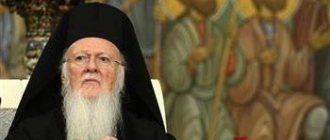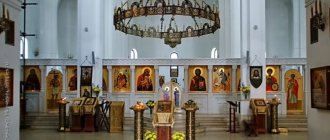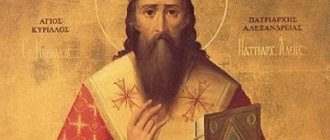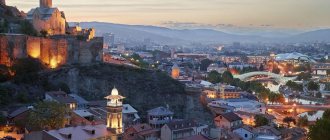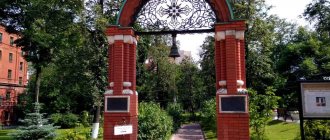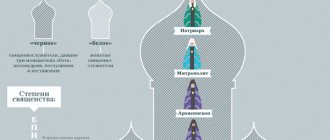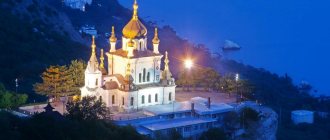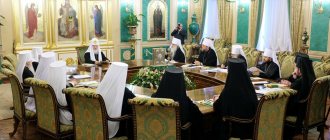Patriarch Kirill has been the primate of the Russian Church since February 1, 2009 (after the death of Alexy II). 12 years have passed since the enthronement of the hierarch. For the faithful of the Christian religion, the issue of ordination is important - the inheritance of the Holy Spirit, which is passed on from the apostles to the patriarchs of our day.
The biography of Patriarch Kirill is of keen interest to the faithful of the Russian Orthodox Church, because bishops and priests consider Kirill to be their primate. From whom did Vladimir Mikhailovich Gundyaev, later called Kirill, receive his ordination - from the authorities above or from a more mundane institution, the KGB?
Childhood and family
Vladimir Gundyaev was born in Leningrad on November 20, 1946 into a religious family, despite the anti-church sentiment that reigned in those years.
His grandfather Vasily Stepanovich (b. 1879), a native of Lukoyanovsky district, was a machinist by training, and he himself began to study theological literature. In 1922, he ended up in Solovki following a denunciation by the Renovationists (a religious movement that stood in opposition to the Orthodox Church after the revolution and for some time was supported by the Bolsheviks), of whom he was an opponent. But even in the camp, Vasily did not abandon his faith, he held secret services, for which he once spent a month in a punishment cell. The Christian remained in exile until 1955.
Vasily Stepanovich Gundyaev
The father of the future patriarch, Mikhail Vasilyevich Gundyaev (b. 1907), dreamed of becoming a clergyman from a young age. After leaving school, he worked for some time as an assistant in Lukoyanov’s church, and in 1926 he moved to Leningrad, where he entered the Higher Theological Courses. He regularly attended all lectures and wrote them down verbatim.
Mikhail Vasilievich Gundyaev
Two years later the courses were closed, Mikhail went into the army. After serving, he entered a technical school, then an industrial university. Initially, he planned to go to study to become a doctor, but because of the mark on theological courses in his personal file, he was turned away. In 1934, he was arrested in the “Kirov case” for serving in church and singing in the choir - just a few days before the wedding. Mikhail was accused of attempting to kill Joseph Stalin.
Parents of Patriarch Kirill
His wife, Raisa Vladimirovna Kuchina (born 1909), taught German at school. Also being a religious person, she enjoyed singing in the church choir, where she met her future husband.
Together with his wife, Mikhail spent three years in Kolyma, then returned to Leningrad and worked at a factory. In 1940, the first-born Nikolai was born. During the war years, Mikhail helped strengthen the city during the siege, and in 1943 he went to the front. After the victory, the family began to live in the city, which was recovering from the blockade, and soon their second son, Vladimir, was born. At this time, the state began to establish a dialogue with the church, and therefore Gundyaev, risking losing his high position in society, nevertheless asked for ordination. In 1947, Mikhail was elevated to the rank of deacon and assigned to the Church of the Smolensk Icon of the Mother of God.
Patriarch Kirill (Vladimir Gunyadev) in childhood
Two years later, relations between church and state that had been warming began to deteriorate again. For his service, Mikhail was imposed an unimaginable fine at that time - 120 thousand rubles (for comparison, for the Pobeda car, which cost about 15 thousand, even wealthy people saved for years). Part of the money was collected from Leningrad parishes, but until Mikhail’s death, the large family (besides Nikolai and Vladimir, the couple had a daughter, Elena, born in 1949), was constantly in debt and suffered terrible poverty. Saved by grateful parishioners who helped out with food.
Vladimir, Elena and Nikolai Gundyaev
The formation of Vladimir’s views was greatly influenced by his grandfather, who returned home in the mid-50s. He told his grandson that even during the most severe camp trials, which claimed the lives of most people, he never felt fear. “For me it was a living experience and a living image of a person who knew what God’s love is,” the patriarch later recalled.
Every school day was a test for Vladimir. An opponent of the communist regime, he became neither a pioneer nor a Komsomol member. When the school director convinced Gundyaev to wear a pioneer tie, he replied: “Okay. If you don't mind me wearing a red tie to church. Because I will." Constant teacher councils and beatings from the director did not prevent Vova from studying well. The soul of the future patriarch lay in physics and other exact disciplines.
The rhythm of the life of the Holy One
— Dear Father Alexander, we see in what a difficult rhythm of life His Holiness lives: almost every day he serves, ordains clergy, meets with many people and at the same time manages to deliver wonderful sermons. He probably also reads tons of official documents. Tell us how his day is structured.
— Yes, indeed, the Patriarch’s schedule is such that, being next to him, you often don’t understand how a person can accommodate and withstand all this.
But, on the other hand, being nearby, you see that His Holiness, first of all, draws his strength from his personal, very deep spiritual life and it is in relation to it that he measures everything else. Organizes his life on a spiritual basis. We recall the well-known Gospel truth: “What is impossible with men is possible with God” (Luke 18:27). And prayer comes first here.
Like any Orthodox person, his day begins with prayer. The Patriarch performs daily rules and services, hidden from human eyes, in the temple of his residence in Peredelkino. Here, in the Danilov Monastery, His Holiness, before the start of the working day and at the end of it, enters the temple and venerates icons and shrines.
But even this side is external. Inside there is a complete awareness that the Patriarch is in the hands of God. As His Holiness has said several times, God does not give a cross beyond human strength, and if the life of the Primate of the Russian Church develops in this way, then this is the undoubted Providence of God both for him and, of course, for our entire Local Church. Probably, now, in the current conditions, a calm, measured lifestyle of the Primate, a gray-haired old man who balances work with time for proper rest, is simply impossible.
— Nevertheless, it would be interesting and useful for our readers to get acquainted with what time His Holiness gets up and how long he sleeps. People who occupy a fairly high position understand perfectly well that without an established daily routine it is difficult to achieve anything, even if you ask God for help.
- As you understand, I can only talk about those things that I see myself.
The Patriarch gets up early in the morning and after prayer and breakfast he leaves for the Danilovsky residence. If you need to serve, and this happens quite often, you get up even earlier.
In the first half of the day, His Holiness works with documents and meets with employees of the Patriarchate. In the second half, official meetings and negotiations begin. Various kinds of guests often come to the Patriarch: clergy, representatives of Local Orthodox Churches, representatives of other Christian denominations, other religious communities, various public and political figures. Many people want to meet him and are looking forward to these meetings. Therefore, His Holiness’s day is often scheduled minute by minute, and, as far as I can see, the Patriarch has practically no free time left.
Meetings of this kind usually last until six in the evening, after which the Patriarch again works with documents, has dinner and leaves home at seven, eight, and sometimes nine o’clock in the evening. Here work with documents continues and closer to midnight the working day ends.
As for rest... On the one hand, the Patriarch does not come to the Danilovsky residence every day: he has days when he works at home, in Peredelkino. On the other hand, you can’t even call it a vacation, because then he takes suitcases of documents with him. His Holiness must read about 300 pages of various kinds of texts every day. And this does not include meetings, services, sermons and preparation for them.
It takes enormous mental and emotional stress to maintain such a schedule.
- How can you read 300 pages of text a day and by the end of these 300 pages understand what is written there? This is not a novel, not fiction.
- Yes, this is not a novel. These are diverse texts, documents of very different levels, directions and scales, and you need to react to each of them differently, switching very quickly from one to another.
In my opinion, this is a normal phenomenon, a natural consequence of the gigantic work that is now taking place in the Church under the leadership of His Holiness the Patriarch.
If we talk about where the Patriarch learned all this, then this includes many years of experience in the Department for External Church Relations (His Holiness has taken part in almost all the key events of church life over the past 40 years), but also, of course, a huge spiritual and life experience.
Education
After graduating from eight years of school, Vladimir did not continue his school education. He decided to live an independent life, without burdening his needy parents, who still had his younger sister in their care. Having settled into the “evening”, in 1962 Vladimir began working as a cartographer in the Leningrad complex geological expedition.
Young Vladimir Gundyaev worked on a geological expedition
In 1965, Gundyaev entered the Leningrad Theological Seminary, and in 1967 continued his studies at the Theological Academy. According to information found in some sources, he completed the program in an accelerated mode at the request of Metropolitan Nikodim Rotov, whose cell attendant (i.e. secretary) Vladimir became later, in 1970.
Religious activities
In April 1969, Vladimir Gundyaev was tonsured a monk and named Kirill, ordained a hierodeacon, and then a hieromonk. A year later, he graduated from the academy with honors and a candidate of theological sciences degree.
In the photo: Vladimir Gundyaev and Metropolitan Nikodim
He combined his activities as Nikodim's secretary with teaching at his alma mater. In 1971, Kirill was elevated to the rank of archimandrite, and in October of the same year he became rector of an Orthodox church in Geneva, Switzerland.
Hieromonk Kirill on the day of his ordination
From this moment on, Kirill begins to move up the career ladder, so to speak. In 20 years he went from archimandrite to metropolitan; was the chairman of the Holy Synod commission, which deals with current issues of the Russian Orthodox Church.
Interview with the future patriarch (1989)
Oil
At one time, Vladimir Gundyaev was one of the co-founders of the Peresvet commercial bank and some other organizations. And since 1996, he has been exporting Russian oil. And oddly enough, he didn't pay taxes for it either. According to official data, in 1997 alone, this business allowed him to earn about $2 billion. It is unknown whether he is engaged in it now.
“Sad and Happy Apple”: creative games for developing children's empathy
Component composition - to help: life hacks for checking the quality of autogas
Saving space and more: why you should love Soviet furniture
Social activity
In the 90s, Patriarch Kirill became increasingly involved in public activities.
In 1994, the television program “The Word of the Shepherd” was released with his participation, which covered spiritual and educational issues in a language understandable to the common viewer. Exclusive interview. Patriarch Kirill
At the same time, Kirill, as chairman of the Department of External Relations of the Russian Orthodox Church MP, organized work on the creation of the concept of the Russian Orthodox Church in the field of church-state relations. The result of his work was the “Fundamentals of the Social Concept of the Russian Orthodox Church” adopted in 2000 at the bishops’ council - a document outlining the official position of the Orthodox Church in interaction with the state.
In the photo: Patriarch Alexy II and Metropolitan Kirill
Since 1995, the fruitful work of Patriarch Kirill began together with the Government of the Russian Federation. He was repeatedly a member of various advisory bodies, took part in resolving issues related to the Chechen Republic during military campaigns; was involved in organizing various cultural events: celebrating the 2000th anniversary of Christianity, holding the Year of the Russian Federation in a number of countries.
Before his enthronement, Metropolitan Kirill was active in public work
Awards
Church:
- Order of St. Sergius of Radonezh II Art. (September 9, 1986, in connection with the 40th anniversary of his birth)
- personalized panagia (July 4, 1988, for active participation in the preparation and conduct of the celebration of the 1000th anniversary of the Baptism of Rus')
- Order of St. equal to Book Vladimir II Art.
- Order of St. Alexy, Metropolitan of Moscow, II Art.
- Order of St. blgv. book Daniel of Moscow I Art.
- Order of St. Sergius of Radonezh I Art.
- Order of St. Innocent, Metropolitan of Moscow, II Art.
- Grand Cross of St. ap. Paul (June 3, 2013, the highest award of the Greek Orthodox Church) [5]
- Order of the Bulgarian Orthodox Church of St. Tsar Boris the Baptist (April 2012) [6]
Also awarded the orders of Alexandria, Antioch, Jerusalem, Georgian, Serbian, Hellenic, Polish, Czech lands and Slovakia, American and Finnish Orthodox Churches, Armenian Apostolic Church and Malankara Church (India).
Secular:
- Order of Friendship of Peoples (1988)
- International Lovi Peace Prize (1993)
- Order of Friendship (1996)
- Order "For Merit to the Fatherland" III class. (2000)
- Order "For Merit to the Fatherland" II class. (2006)
- medal "65 years of Victory in the Great Patriotic War 1941-1945" (2010, Transnistrian Moldavian Republic)
- Order "Sharaf" (2010, Republic of Azerbaijan)
- Order of Alexander Nevsky (2011, first holder of the order [7])
- Order of the Republic (2011, highest order of the Republic of Moldova)
- Order of Friendship of Peoples (2012, Republic of Belarus)
- Order of Yaroslav the Wise, 1st degree (July 27, 2013, Ukraine, in honor of the 1025th anniversary of the Baptism of Rus') [8]
- Order of Merit for the Fatherland, 1st class (November 19, 2016; on the 70th anniversary of his birth) [9]
In 1993, 2000, 2001, 2002, 2003, 2009 and 2010. The Moscow Biographical Institute elected him “Person of the Year” in the “Religion” category.
Patriarchate
Patriarch Alexy II died in 2008. Metropolitan Kirill was appointed to the post of Patriarchal Locum Tenens. In 2009, he was elected Patriarch of Moscow and All Rus', gaining about 75% of the votes in the voting of the Local Council of the Russian Orthodox Church.
On February 1, 2009, Patriarch Kirill was enthroned
Patriarch Kirill did a lot to unite the Russian Orthodox Church abroad. Regular visits to neighboring countries and meetings with religious leaders and representatives of other faiths have significantly strengthened the position of the church, and also expanded the boundaries of cooperation between states.
Patriarch Kirill and Vladimir Putin
Despite his dedication to the cause, the Patriarch has repeatedly spoken out against radical groups, saying that such preachers must be feared. According to him, false teachers are increasingly appearing among the people and plunging people into confusion, because behind beautifully designed slogans hides a powerful weapon for destroying the church.
State
Here we come to the question that interests everyone. Patriarch Kirill's fortune grew very quickly. In 2004, he had $1.5 billion in his bank account, in 2005 he already owned $5 billion, and as of 2022 he owns several tens of billions. But Patriarch Kirill himself never considered himself rich. In his interviews, he always maintained that the money did not belong to him personally, but to the church. This is due to the fact that the Russian Orthodox Church receives the bulk of its income from donations from parishioners, which amount to millions of dollars a year. In addition, the church annually receives about 370 million rubles from the state treasury in the form of assistance for the restoration of churches, the purchase of necessary utensils, etc. Therefore, the exact size of the fortune is impossible to determine, but, according to unofficial data, it is about 10 billion dollars.
Scandals
One of the first scandals that arose with the mention of the name of then Metropolitan Kirill was the case of the use of tax breaks on the import of alcohol and tobacco products in the early 90s. The Novaya Gazeta publication published an article that spoke about the metropolitan’s personal interest in transactions for the import of excisable goods. However, the vast majority of religious leaders said that this was nothing more than a provocation; a planned campaign that aims to tarnish the name of an honest man.
Patriarch Kirill and Dmitry and Svetlana Medvedev at the Easter service
Metropolitan Kirill was also accused of having connections with the KGB. In 2003, President Vladimir Putin received a letter that directly stated that Kirill was a KGB agent. The author of the letter was a priest of the Moscow Helsinki Group, but his actions, regarded by society as a provocation, did not bring any results.
In 2010, a new scandal erupted around the name of the patriarch. Kirill’s colleague Lydia Leonova discovered a thick layer of dust in his apartment. The arriving commission decided that the substance came from the apartment below - its owner, academician and clergyman of the UOC-MP Yuriy Shevchenko was doing renovations. The examination showed that the dust contains carcinogenic substances. The damage caused to the property amounted to more than 20 million rubles, which Lydia Leonova eventually sued from Shevchenko.
Patriarch Kirill: “Don’t strive to live better”
However, the press was interested not so much in the damage caused to the patriarch’s property as in the status of Lydia Leonova, who apparently lived in Vladimir Gundyaev’s apartment. Later, on Vladimir Solovyov’s radio program, the owner of the property explained that the apartment was given to him by Yuri Luzhkov’s deputy by order of Boris Yeltsin, while the patriarch himself “did not live in it for even a week,” but gave it to his second cousin, Lydia Leonova, for use.
In 2012, a photograph of the patriarch with an expensive Breguet watch on his wrist was posted on the Russian Orthodox Church website. Later, the clock disappeared from the photo, but remained in the reflection on the table. The press service of the Russian Orthodox Church called this incident “a ridiculous mistake by the photo editor.” Soon the original version of the photo – with a clock – returned to the site.
The patriarch's watch disappeared from the photograph, but remained in the reflection
Personal life of Patriarch Kirill
When, after a scandal involving property damaged by dust, it became clear that in the ill-fated apartment of Patriarch Kirill on the street. A certain Lidiya Mikhailovna Leonova was registered as Serafimovich, and as expected, there was a fuss in the press. From her biography, journalists only found out that she is the daughter of a cook at the Leningrad Regional Committee of the CPSU.
Journalists believe that in this photo Vladimir Gundyaev was photographed with Lydia Leonova and their son
Despite the fact that the patriarch personally called her his second cousin, in the press she was called “Kirill Gundyaev’s partner,” and he himself was called “an exemplary family man,” and even cited as an example a photograph of them together in 1988. However, the statement about any love affair between them does not stand up to criticism, because Patriarch Kirill completely abandoned his personal life in the name of serving the Lord. Accordingly, he cannot have a wife (let alone a cohabitant) or children.
